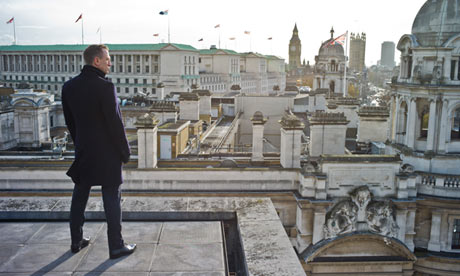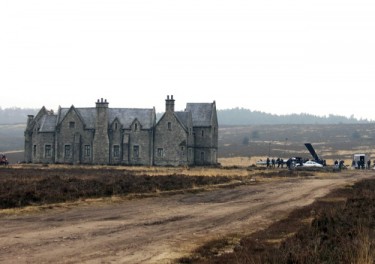The DVD of Skyfall is out and seeing it in the shops has made me think back over that very effective, very strange film. The action, the drama, the visuals and Craig’s James Bond persona are very engaging but there’s another level on which you can watch the film: what it’s trying to do, what it’s trying to say.
The film’s project is fitting Bond, who goes back to the 1950s, into the modern world compatibly. So the film is saturated with newness and oldness. The message is on the need for a headlong rush back to conservative values to face the sensationally terrifying 21st Century.
The James Bond villain generally has two boxes you have to tick: special powers and physical deformity. Raoul Silva has very, very bad teeth. That’s his deformity. His special powers are almost supernatural. Through, I don’t know, being, like, a hacker, he can conjure up helicopters and henchmen who are armed to the teeth. He can drive London tube trains through walls and blow up buildings using their central heating system.
His shining blond hair makes you think of Julian Assange, if you’ve managed to miss all the other signals. He leaks things and hacks into things, and he’s slightly creepy. The piss-take on Murdoch in Tomorrow Never Dies was brilliant but this is a bit of a character assassination. Assange exposed cynical diplomatic rubbish and terrible massacres of civilians. Silva releases the identities of MI6 agents and gets them killed.
Most of the film’s many plot holes come from this basic sensationalising of the power of leaks, hacking and the internet. Where Silva gets all those henchmen, how he can blow up buildings and why nowhere is safe in all of Britain – well, the film seems to say, he does it by, you know, googling and youtubing and whatever else you young people do.
This is also the main pivot of the story, the main question Bond and M have to answer. Is MI6 too old-fashioned to deal with the modern world of cyber-terrorism and hacktivism? M has to go before a tribunal and answer these questions directly to snooty journalists.
Bond and co answer this question in the course of the movie. They defeat Silva by being all old-fashioned and classically British. After their building is bombed, MI6 have to retreat underground to cellars that are doubly historical. Firstly they were built in the 18th Century and secondly they were used during World War II. Memories of good old British spunk and the greatest generation flood the place whenever tube carriages aren’t crashing through the walls.
The exception to this flight into the past, of course, comes with letters of recommendation, or in this case just one letter, Q. This tech-savvy youngster is a clever repackaging of the old concept of Q, ditched when James Bond got a gritty reboot in 2007’s Casino Royale. This is part of the film’s project of reinventing the old elements of Bond in a new form that can compete with the modern evils MI6 must confront.
When the tribunal is crashed, M is in danger and it seems that nowhere in Britain is safe, Bond knows what to do. He digs out an old car and drives north to Skyfall, his family’s grand old mansion. But this is not some effete Jeeves & Wooster country estate.
The place doesn’t make us think of a petty and pathetic aristocracy that’s persisting rather than existing. Skyfall is deep in the wilds within Britain, on the Scottish borderlands. It is a bleak and crumbling mansion, none too huge, evoking a sense of a more muscular aristocracy that is closer to nature and to danger.
This and only this could be James Bond’s family home. It is here and only here (for some reason) that Bond, M and an old family servant have to make their last stand against Silva’s improbably private army. This army, against which all of the repressive forces of the British state are entirely powerless, will break on the rock of Skyfall. There might be some logic here in that the house is old and ramshackle and Silva can’t use the internet to infiltrate it, but this idea isn’t really explored. When Silva and co arrive, it’s a straight-up battle of guns and explosions.
The ending sets the seal on it all. Bond stands on a rooftop contemplating the Union Flag and London architecture.  Then he goes downstairs and all the elements of the familiar Bond set-up come one after the other very cleverly. A woman we have seen repeatedly throughout the film turns out to be Moneypenny. A man we have seen repeatedly throughout the film turns out to be classic male M. Moneypenny is his secretary and he sits in the familiar wood-panelled office which Bond enters in the familiar fashion.
Then he goes downstairs and all the elements of the familiar Bond set-up come one after the other very cleverly. A woman we have seen repeatedly throughout the film turns out to be Moneypenny. A man we have seen repeatedly throughout the film turns out to be classic male M. Moneypenny is his secretary and he sits in the familiar wood-panelled office which Bond enters in the familiar fashion.
The circle is complete – the film has retrieved classic caveman Bond, dusted him off, and constructed a story that retrieves all of its elements in a 21st-century context. The kinda-sexist figure of Moneypenny, who was quietly dropped at some point in the pre-Brosnan era, returns. The idea of Moneypenny is rehabilitated and made “progressive” by her being a good agent in the field during the film.
Bond he doesn’t sleep with as many women as he used to. All he got from Olga Kurylenko was a slap in the face. He doesn’t have any sex at all in Skyfall, except maybe off-camera with an anonymous Greek woman whom we see for a few seconds. It’s unimaginable now that he would slap a woman in the face to get her to stop being hysterical, like Sean Connery’s Bond. I can’t remember whether it was in the film or just in the book of From Russia With Love that he called her a “silly bitch” while he hit her.
What interests me about Skyfall is its context. It came at the end of 2012 with the jubilee, the royal wedding and the London Olympics fresh memories, along with all the rancid British nationalism that came with them. British newspapers were full of long yawn-inducing articles about what it means to be British in the 21st century. I visited the Olympic super-mega-ultra-market in Stratford and I swear, I never saw as many Union Jacks, even in Northern Ireland in July.
Imagine if some working-class family was getting tens of millions a year from the government just to sit on their arses. Imagine how the media would react to that – imagine how the media has treated people who are on benefits – and maybe you can begin to grasp the absurdity of all this royal crap.
My point is, I saw Skyfall with the memory of all that rubbish fresh in my mind. The riots and the destruction of what’s left of the welfare state on the one hand and on the other a glorification of flags, monarchs, imperialist armies and sentimental rubbish about “what it means to be British.” I enjoyed Skyfall on its own merits. Craig is a mesmerizing James Bond. But I think in the future it will be studied as a representative cultural product of Cameron’s Britain – perhaps Britain before the revolt.


Great article. Wrote one on a similar issue for Miscellany
[…] But there was a problem. This was a problem with the whole conception of the character and the mysteries he sits at the centre of. I first recognised this problem when Moriarty did something that has become compulsory for every 21st-century villain: the Joker in The Dark Knight, Bane in its sequel, Loki in Avengers, the baddie Silva in Skyfall… […]